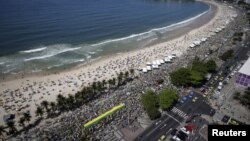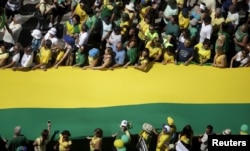Brazilians took to the streets of cities and towns across the country on Sunday for an anti-government protest that's seen as a barometer of popular discontent with the increasingly unpopular president, Dilma Rousseff.
Called out mostly by activist groups via social media, Sunday's protests assailed Rousseff, who is fighting for her political life amid a snowballing corruption scandal that has embroiled politicians from her Workers' Party, as well as a sputtering economy, spiraling currency and rising inflation.
It was the third nationwide day of protests against Rousseff's government this year, following large-scale demonstrations in March and April.
Ratchet up pressure
Political analysts here said that turnout at Sunday's demonstrations could determine the protest movement's future. Massive crowds could ratchet up the pressure on the government while an anemic turnout would give Rousseff some breathing room.
Thousands of people brandishing green and yellow Brazilian flags streamed onto Rio de Janeiro's Copacabana Beach, and smaller demonstrations were under way in the Amazonian city of Belem and the central city of Belo Horizonte.
In the capital, Brasilia, a march on a central avenue flanked by ministries and monuments appeared to have drawn several thousand participants. More than 200 demonstrations were expected around the country.
The demonstrations were called largely by web-based activist groups with demands ranging from Rousseff's impeachment to a return to military dictatorship like the one that ruled the country from 1964-1985.
But an end to corruption appeared to be a top demand, amid the widening probe into corruption at the state-run Petrobras oil company.
Operation "Car Wash," which began more than a year ago as an investigation into a bribes-for-contracts scheme at Petrobras, has exposed how widely corruption permeates Brazilian society, catching top members of the Workers' and other political parties, as well as executives of powerful construction companies.
Lincoln Carlos, a 60-year-old businessman, said he was joining the Rio de Janeiro protest to call for an end to corruption.
"They've robbed the country," he said. "It shameful."
Olympic event, too
The Rio de Janeiro protest, on a broad avenue running along the golden sands of Copacabana Beach, was to coincide with a cycling test event for next year's Olympic Games in the city, but organizers changed the route and timing of the sporting event to avoid a possible clash.
Amid the corruption probe and an economic crunch that has seen the once-booming economy teeter on the brink of recession, Rousseff's popularity ratings have fallen to a level not seen since 1992, when President Fernando Collor de Mello was forced from office after being impeached for corruption. A poll earlier this month showed only 8 percent of those surveyed considered Brazil's government to be "great" or "good."
By contrast, 71 percent said the government is a "failure." The Datafolha poll was based on interviews with 3,358 people on Aug. 4 and 5 and had an error margin of plus or minus 2 percentage points.
In a research note, the Eurasia Group political risk consulting firm called Sunday's protests "an important signpost to monitor."
"While calls for Rousseff to step down will be the headline of Sunday's demonstrations ... the greater risk for the government would be if massive protests become frequent and if they are followed by movements from organized labor," the firm said.
Wave of protests
In 2013, a wave of nationwide protests took analysts by surprise, with the largest crowds in a generation taking to the streets ahead of the Confederations Cup soccer tournament, a World Cup dry run.
Protesters were angry over lavish spending on stadiums and other infrastructure for the 2014 World Cup, which contrasted with the woeful state of Brazil's public schools and hospitals.
Dissatisfaction over poor public services and high taxes continues to bubble here as the country gears up for the 2016 Olympics in Rio de Janeiro.






